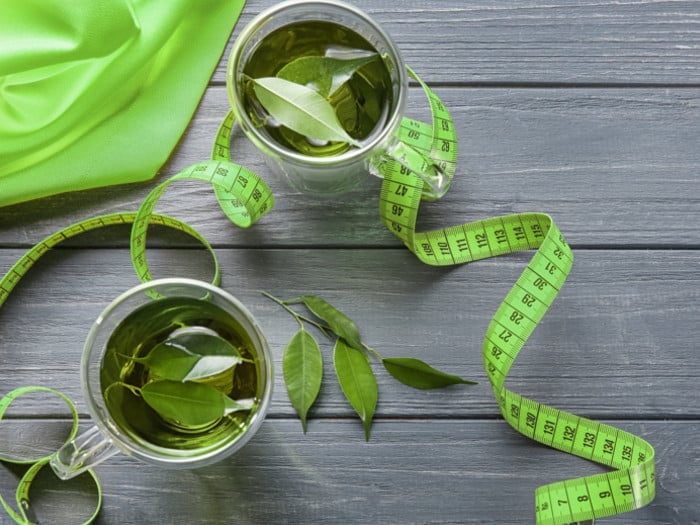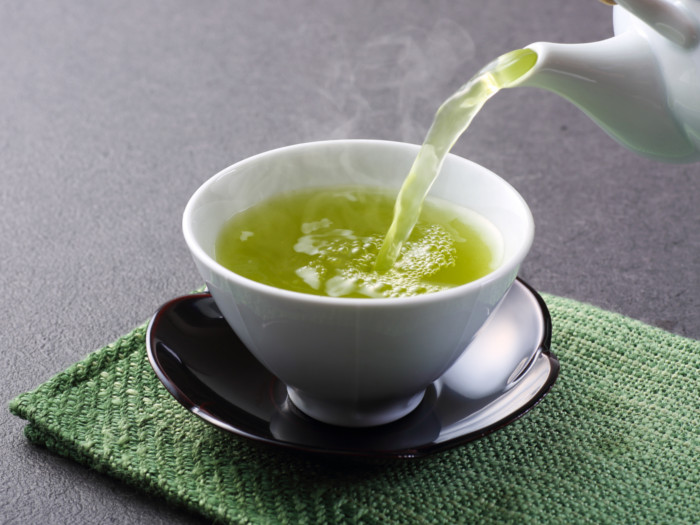Green tea has been a long-standing tradition in China for several centuries. The tea has several health benefits, according to traditional Chinese medicine, and is known to aid weight loss. It is considered one of the healthiest beverages due to its high concentration of antioxidants and nutrients, all of which affect the body in different ways. It is perhaps most well known for containing epigallocatechin gallate, a compound that is directly tied to boosting the metabolism. This is in addition to caffeine, other catechins and polyphenolic compounds, which can help improve organ function and prevent inflammation.
Losing weight can be a challenge for many people, particularly if the obesity is caused by other medical conditions, medications, injuries or hormone disorders. Improving the body’s ability to burn fat is one of the fundamental steps in losing weight and keeping it off. In conjunction with proper diet and exercise, increasing metabolic efficiency and fat-burning potential will lead to shedding those excess pounds. Green tea can provide that energetic boost while affecting several other aspects of health that can aid in your weight-loss goals. [1]
Benefits of Green Tea for Weight Loss
Using green tea for weight loss is a good idea because it will slow down fat deposition, increase fat-burning for usable energy, shed abdominal fat, optimize digestion, reduce blood sugar, and strengthen the immune system.

A healthy drink can help you manage your weight. Photo Credit: Shutterstock
Increases Energy
One of the best functions of epigallocatechin gallate, found in high concentrations in green tea, is its ability to inhibit certain enzymes in the body that break down critical hormones. More specifically, this catechin allows norepinephrine levels to rise, which helps the body to start breaking down fat cells for usable energy. [2]
Improves Exercise Efficiency
Numerous research studies have shown that green tea, as well as green tea extract, can increase the fat-burning activity of the body, making it a popular beverage before a workout. When the body is already working hard to burn calories, green tea can push it even further, helping you get the most out of every gym visit. [3]
Boosts Metabolism
The catechins and caffeine found in green tea can increase metabolism over the long term. Green tea consumption helps raise your passive calorie-burning and improves your circulation.
Burns Abdominal Fat
It is difficult to get rid of abdominal fat. Scientifically known as visceral fat, this is the fatty tissue that can form around our organs in the torso, and can raise your risk of health conditions. Research has shown that the fat-burning caused by green tea predominantly affects this type of dangerous fat. [4]
Manages Diabetes
Diabetes is one of the most common conditions that accompany obesity, but drinking green tea can help regulate blood sugar levels and keep this condition under control, which makes it easier to lose weight and keep your metabolism consistently high. [5]
Boosts Immune System
A weakened immune system leads to increased inflammation, suboptimal organ function, and a drain of resources and energy. Green tea is known to protect the immune system and ensure that you (and your metabolism) can operate at your full potential. [6]
Improves Digestion
Problems with digestion can lead to poor nutrient uptake, cramping, bloating, constipation, inflammation, inability to be physically active, discomfort, and stress. These factors can negatively affect weight-loss efforts. So, drinking green tea can help detox the digestive system and improve its functions, which in turn helps the body manage nutrient uptake more efficiently. [7]
How Much Green Tea to Consume For Weight Loss?
If you are using green tea for weight loss, you must drink at least 2-3 cups of green tea per day for the effects to be noticeable. The amount of caffeine and catechins found in green tea is significant, but for the metabolic boost required to lose weight, at least 200 milligrams of catechins are required daily. 2-3 cups of properly brewed green tea will provide approximately 230-350 milligrams of these beneficial compounds. There is far less caffeine in green tea than in coffee, but it can still have negative effects when consumed in large quantities, so excessive consumption of green tea is not recommended.
Side Effects of Consuming Green Tea
The side effects of consuming green tea include elevated blood pressure, stomach issues, bleeding problems, mineral loss, anxiety, and blood sugar fluctuation. Some of these potential side effects can negatively impact weight-loss efforts, such as digestive issues, diabetes, and stress, so be sure to speak with your doctor before making green tea a large part of your weight-loss plan. [8]
- Blood Pressure – If you already have issues with high blood pressure, the caffeine content in green tea can exacerbate those problems, particularly if you are drinking 3 cups of this tea per day.
- Bleeding Problems – The nutrients in green tea can act as blood thinners, so if you have a bleeding disorder, or are already taking anticoagulants, you may want to avoid green tea.
- Gastrointestinal Distress – Caffeine can wreak havoc on the stomach when consumed in large quantities, causing vomiting, diarrhea, cramping, acid reflux, and irritable bowel syndrome. If you have a sensitive stomach and typically avoid caffeine, start with 1 cup per day.
- Mineral Loss – One of the unusual properties of green tea is its impact on calcium levels in the body; more specifically, it increases the expulsion of calcium in the urine, which can weaken the bones over time. Be sure to complement your diet with calcium-rich food to make up for this effect.
- Anxiety – Caffeine, despite being in relatively small quantities in green tea, can make symptoms of anxiety and sleeplessness worse, so monitor your mood and intake carefully.
- Diabetes – Green tea’s active ingredients can lower blood sugar levels, which is good for diabetics, but it can be dangerous if you are already taking medication or insulin injections for diabetes.
How to Prepare Green Tea?
Brewing green tea is very simple, requiring only loose-leaf tea or a green tea bag. If possible, you should purchase green tea that has been grown in China or Japan, as these countries have the longest tradition of cultivating and harvesting green tea leaves of the highest quality.

How to Make Green Tea: Easy Recipe
Ingredients
- 1 green tea bag or
- 1 tsp loose-leaf green tea
- 1 cup water filtered
- 1 tsp organic honey optional
- 1 lemon slice optional
Instructions
- Boil the water in a small pot and then allow it to cool for 1-2 minutes. The ideal cup of green tea should be steeped just below the boiling temperature.
- Add the loose leaves or the tea bag to a cup and slowly pour over the hot water.
- Allow the tea to brew for 2-3 minutes before removing the tea bag.
- Add the slice of lemon or honey. Lemon can help increase the bioavailability of catechins and antioxidants in the body, making it an ideal complement to a cup of green tea.
- Serve and enjoy!

How to Drink?
Green tea is best when served without milk, because many of the fatty compounds in milk bind to the active ingredients and flavonoids in green tea, making it difficult for the body to absorb, essentially negating the possible health benefits.
When it comes to heating an old cup of green tea, however, don’t be worried about the tea being “too old”. Studies have shown that giving a lukewarm cup of tea a quick heat-up in the microwave can increase catechin availability, rather than drinking the tea when it is no longer warm.
To ensure the best results when drinking green tea for weight loss, it is also best to use relatively fresh tea bags that have been stored in a cool, dark place for less than 6 months. After this point, some of the nutrients and active ingredients will begin to lose their potency, making the tea weaker and less effective for weight loss.
